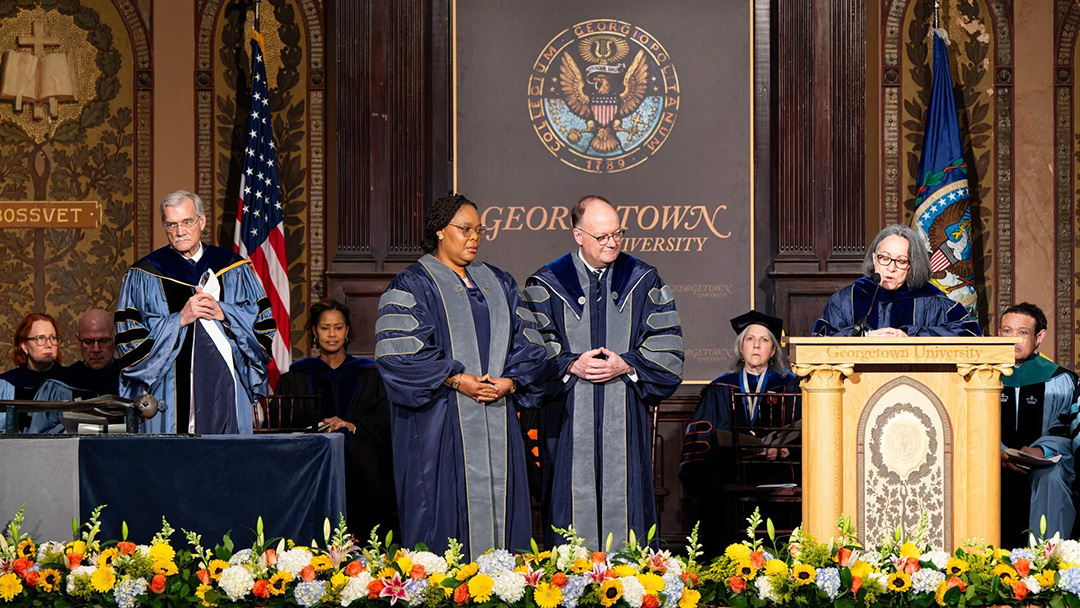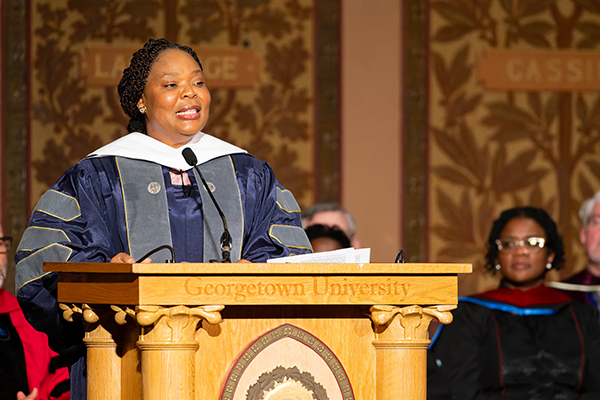
IGLTP Executive Director Leymah Gbowee receives an honorary degree at Georgetown University.
Photo Credit: Phil Humnicky/Georgetown University
FOR IMMEDIATE RELEASE
Washington, D.C — On February 13, 2024, Nobel Peace Laureate and Executive Director of the Institute on Gender, Law, and Transformative Peace Leymah Gbowee delivered the Oliver Tambo Lecture at Georgetown University and was presented with an Honorary Degree of Humane Letters.
Ms. Gbowee’s lecture was entitled “Peace Is…” and spoke to her history as a central organizing figure in Liberia’s peace movement. Ms. Gbowee is a peace activist, organizer, trained social worker, political figure, and women’s rights advocate. She was awarded the 2011 Nobel Peace Prize in recognition of her leadership of the Women of Liberia Mass Action for Peace—which brought together Christian and Muslim women in a nonviolent movement that played a pivotal role in ending Liberia’s civil war in 2003. Ms. Gbowee’s peacebuilding work has been highlighted in the 2008 documentary, Pray the Devil Back to Hell, and in her autobiography, Mighty Be Our Powers: How Sisterhood, Prayer, and Sex Changed a Nation at War. In her lecture, she reflected on various moments throughout her life that have shaped her understanding of peace and justice.

IGLTP Executive Director Leymah Gbowee gives the Oliver Tambo lecture at Georgetown University. Photo Credit: Phil Humnicky/Georgetown University
Ms. Gbowee spoke to the need to turn away from solely statistics and numbers in discussions of violence, war, and peace, and to instead turn towards naming people and events as they are—with the centering of humanity. She discussed how peace requires consistency and persistence, as well as the conditions needed for human security. Ms. Gbowee drew on various key moments from her life where she was challenged to question and expand her understanding of what peace means.
As Ms. Gbowee noted, freedom fighters like Oliver Tambo, the South African racial justice activist, knew these lessons well. Tambo was central to the struggle against apartheid in South Africa. Together with Nelson Mandela, he established South Africa’s first black law practice. In 1958 he became the deputy president of the African National Congress (ANC), the South African anti-apartheid political party, and served as the ANC president between 1967 and 1991. After the South African government banned the ANC in 1960, Tambo left South Africa to establish the organization’s foreign headquarters in Zambia. As the Apartheid Museum notes, “With so many of his comrades imprisoned, he served as the key organiser, strategist, representative and father figure of the liberation movement. A man of enormous discipline and determination, he was renowned for his compassion, and his gentle nature.”
Past speakers of the Oliver Tambo Lecture at Georgetown, named for Tambo’s lecture there in 1987, have included Archbishop Desmond Tutu and UN Secretary-General Kofi Annan, among many other historical figures central to peace activism. Gbowee noted how honored she was to join their company, and the critical nature in these times for shining a light on everyday peace and justice work happening around the globe.
“Throughout my journey, I have come to the conclusion that peace is not just the absence of war, but the presence of conditions that give dignity to all,” Ms. Gbowee concluded in her remarks. “Peace is sacrificing your comfort and your life in some instances. Peace is investing in the future to ensure conditions that dignity all exists. Peace, distinguished ladies and gentlemen, is recognizing and honoring our collective humanity.”
###
If you are a member of the press and would like to interview an expert from the Institute on Gender, Law, and Transformative Peace, please contact communications@law.cuny.edu. Inquire about collaborating with the Institute on Gender, Law, and Transformative Peace at IGLTP@law.cuny.edu.
